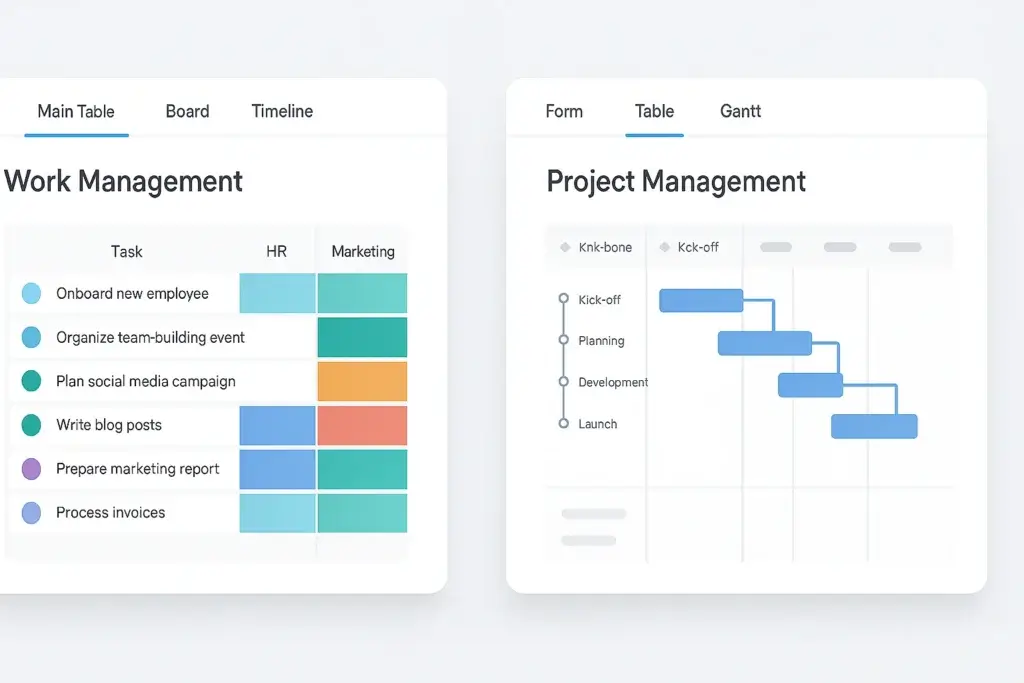
Did you know that comparing work management vs project management isn’t just academic; it affects your team’s success directly? Research from the Standish Group reveals that all but one of these projects fail to meet their objectives. The numbers don’t lie – only 35% hit their targets. Take Hershey Foods as an example. Poor planning in their system implementation led to a $100 million loss.
Work management includes your business workflow from end to end. It coordinates tasks and resources throughout your operations without a set endpoint. Project management takes a different approach. It zeros in on finishing specific initiatives within strict deadlines and budgets. Both methods boost efficiency and productivity, but serve different roles in your organization. The difference between task management and project management helps you pick the right system for your team’s needs. Work management creates repeatable workflows that improve consistency and quality in your deliverables. Your teams can do more with their existing resources.
This piece breaks down these management approaches. You’ll learn which one, or what combination, works best for your team’s goals and style.
What is the difference between work and project management?
Teams need to know the basic differences between work management and project management to pick the right approach. These systems might look similar at first glance, but they serve different purposes.
Work management definition and scope
Work management helps plan, organize, and track all business tasks and workflows throughout your organization. Unlike project systems, work management includes ongoing operations and processes that don’t have a specific end date. This detailed approach helps coordinate daily activities that keep the business stable and spot opportunities for growth.
“Work management takes a big-picture view of a team, department, or enterprise overall,” and makes activities more efficient even without clear milestones. It brings clarity to tasks and helps teams coordinate better to avoid confusion. Companies benefit from this style, especially when they have multiple departments working on different initiatives at once.
Project management definition and scope
Project management focuses on planning, executing, and finishing specific projects with defined objectives. These projects come with clear start and end dates to create something specific, like a product, service, or event.
Project management uses “processes, methods, skills, knowledge, and experience to achieve specific project objectives according to acceptance criteria within agreed parameters”. It deals with managing resources, tasks, schedules, and risks within each project.
How they overlap and differ
These management approaches share some common ground while staying distinct:
- Timeframe: Work management runs continuously without end dates, while project management follows fixed timelines with specific deadlines.
- Structure: Projects usually have dedicated managers or teams, but work management involves stakeholders from different departments.
- Focus: Project management tackles specific lifecycle goals, unlike work management’s broader operational scope.
- Resources: Work management balances resources across business activities, while project management assigns them to meet project needs.
Both approaches use task management, reporting, people management, and communication tools. In spite of that, each serves its purpose – work management keeps operations running smoothly, while project management helps achieve specific goals through targeted initiatives.
Your choice between these approaches depends on whether you need to handle daily operations or tackle a specific, time-limited goal.
| Aspect | Work Management | Project Management |
| Timeframe | Ongoing, no defined end | Fixed start and end dates |
| Scope | Broad, encompassing all tasks and workflows | Specific, focused on particular objectives |
| Structure | Cross-departmental collaboration | Dedicated project teams |
| Objective | Optimize overall operations | Achieve specific goals or deliverables |
| Example Tools | monday.com Work Management, Asana | monday.com Projects, Trello |
Key comparison: work management vs project management
Work management vs project management shows clear differences in five key areas that affect how teams operate. These differences will help you choose the right approach for your organization’s needs.
1. Timeframe and duration
The biggest difference is how time works in each approach. Project management uses clear start and end dates and aims to complete specific initiatives within set timeframes. Work management might use fixed dates, but we designed it for fluid, ongoing operations. Projects can last months or years with specific phases. Work management handles both daily tasks and continuous operations that keep your organization running beyond single projects.
2. Structure and team roles
Projects need a dedicated manager or specialized team to guide them to completion. Work management brings together many stakeholders from different departments. This reflects their different purposes. Projects need focused expertise to meet specific goals. Work management coordinates efforts from teams throughout your organization. The open nature of work management lets everyone, including leaders, see how tasks are progressing.
3. Task management vs project management
Task management makes a key difference in this comparison. Projects combine related tasks to reach specific goals within limits. Simple task management deals with individual items. Projects are more complex and need multiple team members, clear goals, resources, and constraints. Task management fits into both approaches but works differently in each case.
4. Budget and resource planning
These approaches handle budgets in substantially different ways. Projects use clearly defined budgets to guide decisions. Research shows 28% of project failures happen because of wrong cost estimates. Project budgets need detailed planning and adjustments throughout their lifecycle. Work management spreads resources across business activities. Teams often work without strict budget frameworks and can ask for specific funding or get reimbursed after approval.
5. Deliverables and outcomes
Projects create specific outputs that meet measurable criteria by set deadlines. These outcomes, like reports, software, or buildings, serve as standards for progress. Work management aims to improve the internal productivity culture. It focuses on organizing workflows, processing tasks reliably, and meeting deadlines. Projects deliver specific results with clear completion points. Work management creates lasting value by improving processes continuously.
⚙️ Feature Comparison of Work and Project Management Tools
While both work management and project management tools often share similar features, each type of tool prioritizes functionality differently to match its unique objectives. Understanding these feature distinctions can help you select software that aligns perfectly with your team’s workflow and goals.
Below is a comparison table highlighting the core features you’ll typically find in work management versus project management tools:
| Feature | Work Management Tools | Project Management Tools |
| Task Tracking | Yes | Yes |
| Workflow Automation | Advanced | Basic to Advanced |
| Resource Allocation | Across departments | Project-specific |
| Reporting Dashboards | Comprehensive, real-time | Project-focused |
| Integration Capabilities | Wide-ranging (e.g., CRM, HR systems) | Focused on project tools (e.g., Gantt charts) |
When to use each approach
The choice between work management and project management depends on your team’s needs and how you operate. Both approaches excel in different scenarios and serve specific goals in your organization.
Best use cases for work management
Work management shines when handling ongoing operations that drive your organization forward. You should use work management when you need to:
- Run daily operations and recurring tasks that don’t have clear endpoints
- Coordinate teams of all sizes across departments
- Build flexible workflows that change with priorities
- Handle individual tasks supporting broader business functions
- Keep the business stable while finding growth opportunities
Work management tools help with task assignments, workflow automation, and improved productivity across your organization. Teams that need clear visibility into all activities find these tools particularly valuable.
Best use cases for project management
Project management runs on defined initiatives with clear objectives. This approach works best when you:
- Handle temporary initiatives with set timelines
- Work under strict budgets and resource limits
- Deliver specific outcomes you can measure
- Control complex, connected tasks toward one goal
- Roll out new technologies or reshape old processes
Research shows that project management styles change based on how stable requirements are. Teams get better results with predictive project management when requirements are clear from the start. Adaptive approaches work better when requirements might shift during implementation.
How to combine both in hybrid teams
Hybrid workplaces create unique challenges that need trailblazing solutions. Many organizations now use hybrid approaches that:
- Apply project management to specific initiatives while using work management for daily tasks
- Use predictive approaches for stable parts and adaptive methods for changing elements
- Utilize digital tools as shared workspaces for both project and ongoing work
- Build teams based on time zones, how they work together, and their skills
- Set clear meeting guidelines to help remote and office teams work smoothly
A successful hybrid setup needs careful planning, reliable digital tools, and strong communication. This balanced approach helps your team excel at daily operations while completing specific projects successfully.
Choosing the right fit for your team
Choosing the right management approach needs a careful assessment of your team’s specific traits and needs. Understanding your team’s unique dynamics is vital to making an informed decision between work management and project management approaches.
Assessing your team’s workflow style
The best way to determine which management style fits your team starts with looking at how information flows among team members. Your team’s composition, individual working styles, and operational pace create the foundation to work efficiently. You should recognize strengths and weaknesses within your team and think over factors like workload capacity and day-to-day operational patterns.
A structured workflow encourages open communication and idea sharing that creates a cohesive environment. Yes, it is natural that team members feel more motivated and involved when they understand their tasks and their contribution to broader objectives.
Evaluating project complexity and frequency
Project complexity greatly affects which management approach will serve your team best. Research shows that approximately 49% of projects managed fall into high or very high complexity categories. Complexity typically comes from:
- Criticality of goals and scope changes
- Interdependence between firms
- Stakeholder influence
- Technical requirements
Complex or frequent projects often need formal project management, while simpler, ongoing tasks work better with work management approaches.
What is the purpose of work management?
Work management acts as a systematic approach to organizing workflows across your organization. We coordinated people and work at all levels to ensure everyone has the necessary information to accomplish priority tasks.
Work management’s main goal provides clarity, reduces silos, and creates efficient cross-functional collaboration. It builds a centralized hub for all work that allows teams to track progress toward company initiatives while you retain control of operational stability.
Signs you need a work management system
You should implement a work management system if you notice:
- Similar data gets entered into multiple systems repeatedly
- Too many Excel documents circulate via email for approvals
- Paper forms or PDFs still dominate processes
- Legacy systems prove too rigid for new business opportunities
- Many custom point solutions become hard to maintain
Teams facing these challenges need a complete work management solution. This solution provides the framework to move beyond inefficient practices and delivers better collaboration, improved accountability, and efficient processes throughout operations.
Real-Life Example: monday Work Management vs monday.com’s Project Management
To make the distinction between work management and project management more practical, let’s look at how monday.com itself separates these two approaches in its suite of products.
🔷 monday.com Work Management
This is a broad platform designed to help teams manage all types of work, whether it’s recurring tasks, cross-department workflows, or ongoing operations.
Use cases include:
- Marketing campaign tracking
- HR onboarding workflows
- Sales pipelines
- Product launches with multiple teams involved
Top features:
- Customizable boards and dashboards
- Workflow automations
- Time tracking and approvals
- Cross-team collaboration across departments
Ideal for: Teams who need a centralized hub to manage diverse workstreams, not just one-time projects.
🔶monday.com Project Management
This is a focused setup that helps teams manage structured projects with clear timelines, deadlines, and deliverables.
Use cases include:
- Website redesign
- Event planning
- Software development sprint
- Construction projects with fixed milestones
Top features:
- Gantt charts and timelines
- Milestone tracking
- Task dependencies
- Workload planning
Ideal for: Teams managing temporary, goal-oriented efforts with a beginning and an end.
🆚 The Key Difference

| Feature/Aspect | Monday Work Management | Monday Projects |
| Scope of Use | Broad, ongoing workstreams | Specific, time-bound projects |
| Structure | Flexible and customizable | More structured and phased |
| Team Types | Cross-functional departments | Project-based or technical teams |
| Ideal For | Operational workflows & tasks | Milestone-based project execution |
Work management is for continuous collaboration and operations, while project management is for driving specific, outcome-based initiatives.
Conclusion
Your team’s productivity and success depend heavily on choosing between work management and project management. Work management works best to coordinate ongoing operations across departments without defined endpoints. This makes it perfect for daily business activities and recurring workflows. Project management shines when teams need to handle specific initiatives with clear objectives, timelines, and budgets.
Your specific needs will determine the right choice. Teams that manage continuous operations get more value from work management’s flexibility and cross-functional coordination. Project management’s well-laid-out approach suits teams working on discrete initiatives with definitive outcomes. Many organizations have found success with hybrid solutions. They apply project management principles to specific initiatives while using work management systems for daily operations.
Teams should pick the right management approach based on their workflow style, task complexity, and operational patterns. A complete work management solution helps teams that struggle with data duplication, too many spreadsheets, or rigid legacy systems. Reliable project management frameworks benefit teams that handle complex projects with strict deadlines and budgets.
The right management system lets your team work faster and stay focused on strategic objectives. You can make better decisions that line up with your organization’s unique requirements and goals by understanding these key differences.
Check out our updated guide to the best project management tools to compare leading platforms and find the perfect match.
FAQs
What are the key differences between work management and project management?
Work management focuses on ongoing operations across an organization without defined endpoints, while project management deals with specific initiatives that have clear objectives, timelines, and budgets. Work management coordinates daily tasks across departments, whereas project management concentrates on completing individual projects with specific deliverables.
How do work management and project management differ in terms of resource allocation?
In work management, resources are balanced across various business activities and processes. Project management, on the other hand, allocates resources specifically to fulfill the requirements of individual projects. This difference reflects the broader scope of work management compared to the focused nature of project management.
When should a team choose work management over project management?
Teams should opt for work management when they need to optimize daily operations, coordinate cross-functional activities, create flexible workflows, and maintain business stability. It’s ideal for managing ongoing tasks that contribute to broader business functions without specific endpoints.
What are the signs that a team needs a work management system?
Indicators that a team needs a work management system include repeatedly inputting identical data into multiple systems, excessive use of spreadsheets for approvals, reliance on paper forms, rigid legacy systems hindering new opportunities, and difficulty maintaining numerous custom point solutions.
Can work management and project management approaches be combined?
Yes, many organizations implement hybrid approaches that combine both work management and project management. This can involve using project management for specific initiatives while maintaining work management for daily operations, or applying different approaches to various components of work based on their stability and complexity. The key is to balance operational excellence with successful project completion.






